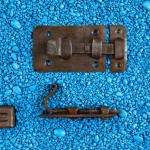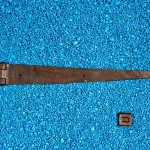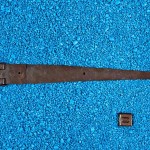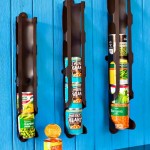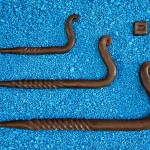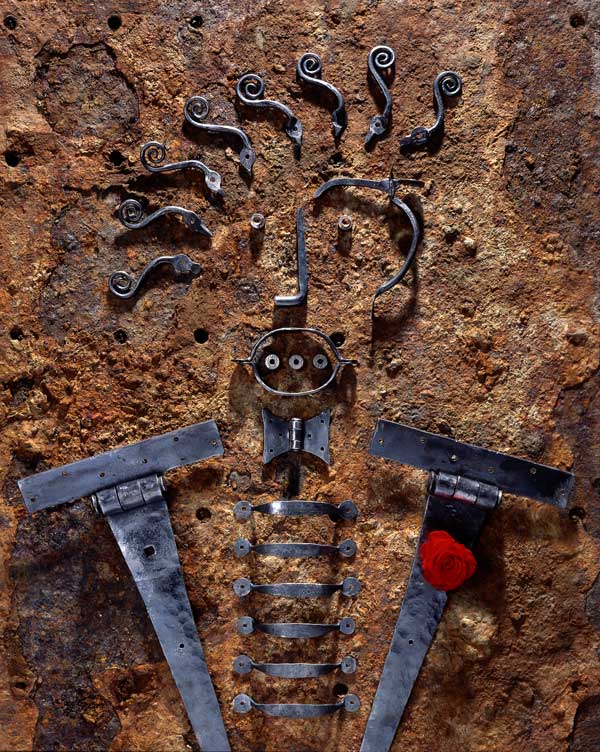
.
On this website we offer for sale or commission various hand made artefacts; hinges and hooks and bolts and so on.
They are quite expensive – at least when compared to other apparently similar goods available on the internet, and I am sometimes asked why this should be.
I would put forward three good reasons for this.
1) because they are hand made (and hand forged where appropriate), in workshop, rather than factory, conditions;
2) because that whole process happens here in the UK;
3) because they are, by and large, unique.
I shall try not to be too wordy in expanding on these points.
1) Firstly the term “hand made” begs qualification, for it can be used very loosely.
Iron, steel, mild steel, in fact nearly all of the metals, are materials that ones’ hands alone will have very little impact upon; you need tools to form and manipulate them, whether hot or cold. So to say that a metal object is hand made is really to say that either the tool used, or the material being worked, in the making process is physically in the hands and control of the maker.
This we can say.
We take this definition one stage further and exclude the use of electric welding processes in the designing and making of our ironmongery. A lot of the character of metal objects lies in the details of how the elements are joined to each other, and it is our opinion that the option of electric welding, in our sphere of work is nearly always detrimental to good detailing.
- slide bolt
As an example of this, take the small bolt illustrated above (click on image to enlarge); you can see that the three (forged) straps through which the bolt runs are attached to the backplate by passing through it and then being hot riveted over on the hidden face; this must be one of the most ancient ways of effecting such a joint and is mechanically about as good as it gets, Were we a factory, with our primary interest being the transformation of raw material and manpower into cash. it would be more economical to follow the precepts of Henry Ford and to mechanize such processes, in this instance probably by spot welding the keeps to the backplate…. but we are not; and so we don’t.
The results, in my opinion, are both visually satisfying and functionally effective. However, there is a price on this sense of satisfaction; it all takes longer to do!
We also use the phrase “hand forged” in our descriptions.
You can see, if you look in the commissions section of this site, that we are, genuinely, a forge and not a factory; we are not in the business of churning out confections of plasma cut steel, a bit mangled at the edges to look as if they have been forged . Consequently we use the term hand forged to mean that, where applicable and necessary, the work is done hot, either actually forged by hand or under the power hammer. This is not just to give the work a battered appearance. As much cannot be said for every article that bears the tag hand forged.
For instance the hinge illustrated below is forged because the design of the knuckle involves wrapping the tail all the way round under the plate of both the strap and of the vertical member; this is necessarily a hot operation and it is done like this for good, structural reason – a hinge made this way can be quite light weight, visually and physically, and will yet carry a substantial weight without much risk of distortion. They also look great (I think).
- tee hinge front
- tee hinge back
But again this is a longer process……
2) Have it made abroad?
- juba smith
Friends, relations and other similarly wise and caring people, have not infrequently advised me that I would do much better to devote my time to the design and marketing of my range of forged goods but to have them made somewhere else where labour is plentiful and cheap. Alluring visions of ease and soft clean hands with intact fingernails, extensive visits to hot and interesting places, ( yes, of course, darling, but it is business ….)etc.
The figures looked likely to stack up and there were even realistic options for setting up such an operation within my own spread out family.
Then, a few years ago, while trying to bring to the marketplace a wonderful (I thought) idea that I had been developing I went to a state backed seminar upon the subject of patents and intellectual property and was surprised to learn that, since we are now a “knowledge based economy” it was ,essentially, pointless for me to consider trying to make things in this country.
This government line appeared not dissimilar to that of the earlier mentioned wise and caring friends and relations – but with a significant difference; there was an underlying arrogance, almost of the john bull vs johnny foreigner variety, which, along with the general shortsightedness of the attitudes that informed the seminar, made an impression that other kindly advices received before had failed to make.
My thoughts, for what they are worth, went something like this:
– We may well be a knowledge based economy at present; could it be that this is only because we have dismantled everything else about our economy and the knowledge is all that’s left?
– Thirty years hence we will not have such a monopoly; nor will the labour in the developing economies remain cheap and exploitable indefinitely.
– There are no free lunches and we are fools to think that the extended banquet we have been enjoying for the last fifty years was all paid for upfront by previous generations.
– And so on and so forth……… (with growing stridency……))
Well, the ‘wonderful idea’ was not patented, (although it does remain in process) but my reluctance to become a middleman was nourished, as was my determination to persevere in my endeavours . Such stubbornness is probably stupid, and from a get rich quick standpoint pretty ill advised. But the considerations behind it. are, I think, reasonable enough.
– I believe that hands on manufacture of nearly any sort enriches society, and that the genuinely hand made artefact is culturally important, particularly in this age of super efficient mass production and CAD.
– I am smitten with our architectural and metal working heritage and wish to make a good, rather than a bad, contribution to it.
– I believe that we should be trying to re invent our home manufacturing base, quite possibly on a ‘small is beautiful’ sort of platform.
– The business of making is what I am good at and enjoy.
3) The third stated reason was that our offerings are, by and large, unique. I feel that I have to repeat this phrase here because I have droned on for so long since first uttering it that I’m amazed that anyone should have got this far!
Fortunately for all parties I don’t feel the need to labour this point, as, if it is true, it should be self evident, particularly once the points I have been trying to make above have been given due weight.
So, I would just say this; how often have you come across one of these?
- tin dispensers
or these
- large screw in hooks
?????
